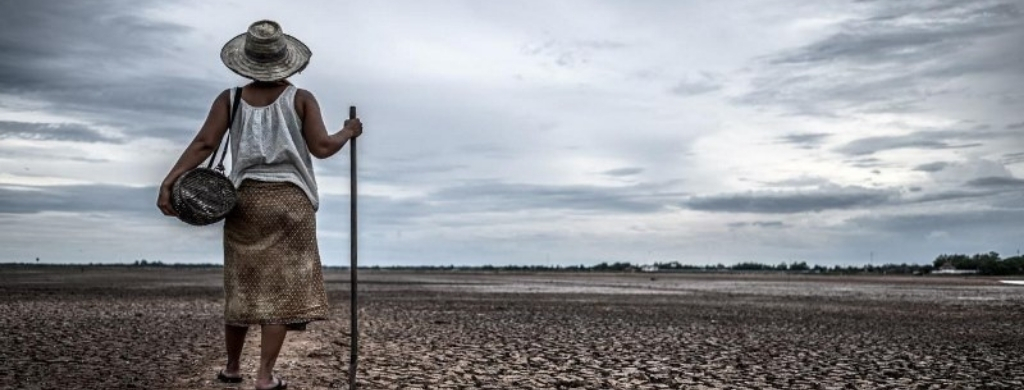How can COP26 address modern slavery and climate change?
Dear President Delegate, Rt Hon Alok Sharma
The world is experiencing climate breakdown and an era where the provision of human rights and dignity is stalling. Something is broken and the status quo will not fix it.
This is the decade in which we must both collectively limit climate change and make our societies more equal and just. Otherwise, we will emerge from the global pandemic locked into a climate and poverty emergency in which already marginalised people become exploited though forced labour, child slavery and forced marriage, and human trafficking.
COP26 must deliver on the vision of a global, just and transformational recovery that integrates, defends and expands human rights; and reduces inequality by prioritising the needs of the most affected, marginalised and discriminated people.
COP26 is also an important test of the Paris Agreement and an opportunity for governments of the world to raise their ambition in response to the climate crisis.
Our recommendations for COP26 are that governments should:
- Recognise the link between climate-induced migration and modern slavery and include it as an action in climate targets and create provision in the Green Climate Fund (GCF) for migration and modern slavery related responses.
- Include and track the progress of climate-induced migration/displacement and anti-slavery actions in Nationally Determined Contributions (NDCs) and National Adaptation Plans through Adaptation Committees.
- Consider the need to address climate-induced risks of modern slavery in the Warsaw International Mechanism Task Force on Displacement (WIM TFD) recommendations to avert, minimise and address displacement related to the adverse impacts of climate change.
- Use the opportunity of a Just Transition to sustainable renewable energy to provide decent work for all workers in the renewable energy sector, and tackle instances where forced labour is used in mineral extraction and manufacture of solar panels and renewable energy supply chains.
Evidence shows that climate change impacts are already increasing vulnerability to modern slavery. While several overlapping socio-economic, political, cultural and institutional risks shape vulnerability, they are increasingly evidenced to be made worse by climate change impacts and environmental degradation.
Forced labour is also often found in climate destructive industries. In many parts of the world, development models based on resource extraction and export-oriented agribusiness are worsening vulnerability to exploitation and modern slavery by monopolising land and resources, polluting the soil, air and water, destroying ecosystems, and driving displacement.
In addition, low-income countries are exposed to some of the most severe climate impacts, and have the least capacity to adapt and find it hardest to recover from the loss and damage caused by devastating floods, droughts, heatwaves, cyclones, and rising sea levels.
In many cases these conditions lead to people being forced to migrate and leave the lands or the jobs that can no longer provide them with a living. In an increasing number of cases this makes them open to exploitation, trafficking and modern slavery. The World Bank predicts that as many as 143 million people will migrate within their own borders in just three regions of the world by 2050 unless action is taken to address climate change. 30.1 million weather-related displacements took place in 2020, including 9.8 million affecting children according to IDMC and UNICEF UK.
An integrated social, economic, and environmental response is needed that builds the resilience of vulnerable populations to climate impacts and modern slavery together.
Yours sincerely,
Jasmine O’Connor OBE, CEO, Anti-Slavery International
Nick Grono, CEO, The Freedom Fund
Philippe Sion, Managing Director, Humanity United
Kristen Abrams, Senior Director, Combatting Human Trafficking, The McCain Institute
Alex Their, CEO, Global Fund to End Modern Slavery
Mohamad Abdi, National Coordinator, Destructive Fishing Watch Indonesia
Steven Trent, CEO/Founder, Environmental Justice Foundation
Joanna Ewart-James, Executive Director, Freedom United
Zelda Keller, Executive Director, The Institute for Climate and Peace
Yuka Iwatsuki, President and Co-Founder, Action Against Child Exploitation
Olga Martin-Ortega, Leader, Business, Human Rights and Environment Research Group
Aloysius Arockiam, Director, SAVE – Social Awareness and Voluntary Education – India
Carolina Rudnick, President, Fundación Libera contra la Trata
de Personas y la Esclavitud en Todas sus Formas – Chile
Rosie Riley, Founder and CEO, GP Registrar, VITA Network, VITA Training Ltd
Laura Wood, Research Director, Pediatrician, VITA Network, VITA Training Ltd
Sarah Boutros, Pediatric Registrar, VITA Network, VITA Training Ltd
Jordan Lin, Blog Coordinator, VITA Network, VITA Training Ltd
Ishaan Shah, Founder, Stolen Dreams
Saphia Fleury, Researcher, University of Hull
Sneh Aurora, Director, Commonwealth Human Rights Initiative
Colleen Theron, CEO, Ardea International
David Westlake, CEO, International Justice Mission UK
David Hillman, Director, Stamp Out Poverty
Charlotte Kennedy, Head of Campaigns and Communications, Robin Hood Tax
Dominique Muller, Policy Director, Labour Behind the Label
Mike Dottridge, Expert on human trafficking, Former trustee of UN Fund on contemporary forms of slavery
Andrew Wallis OBE, CEO, Unseen
Christian Guy, CEO, Justice and Care
Stephen McCloskey, CEO, Centre for Global Education
Rachel Phillips Rigby, Human Rights Lead, Rainforest Alliance
Donna Robinson, Attorney, Robinson Law Office, LLC
Terry Collingsworth, Executive Director, IRAdvocates
Caroline Downey, Executive Director, Women Working Worldwide
Habte Hagos, Chairman, Eritrea Focus
Mark Dearn, Director, Corporate Justice Coalition
Shakirul Islam, Chairperson, Ovibashi Karmi Unnayan Program
(OKUP) – Bangladesh
James Kofi Annan, President, Challenging Heights
Enock Dery Pufaa, Senior Manager, Impact, Challenging Heights
Peter McAllister, Executive Director, Ethical Trading Initiative
Kath Dalmeny, Chief Executive, Sustain: The alliance for better food and farming
Gema Fernández Rodríguez de Liévana, Managing Attorney, Women’s Link Worldwide
Hideki Wakabayashi, Executive Director, JANIC
Shom Luitel, Advisor, People Forum for Human rights
Dr Carole Murphy and Dr Ruth Van Dyke, Co-Directors, Bakhita Centre for Research on Slavery, Exploitation and Abuse, St Mary’s University
Phil Bloomer, Executive Director, Business & Human Rights Resource Centre (BHRRC)
Dr Chris O’Connell, Researcher, Dublin City University
Dr Caitríona Ní Cassaithe, Lecturer, Dublin City University
Tim Nelson, CEO, Hope for Justice and Slave Free Alliance
Victoria Marks, Director, Anti-Trafficking and Labour Exploitation Unit
Kate Garbers, Modern Slavery Consultant, Independent
Xavier Plassat, Coordinator of CPT’s, Pastoral Land Commission (CPT, Brazil)
Pablo Iturralde, Executive Director, Centro de Derechos Económicos Sociales y Culturales del Ecuador
Akiko Sato Deputy, Secretary General, Human Rights Now
Julia de Boinville, Co-founder, The Anti-Slavery Collective
Isabella Clarke-Price, Associate Director, The Anti-Slavery Collective
Minh Dang, Executive Director, Survivor Alliance
Laura Murphy, Professor, Helena Kennedy Centre, Sheffield
Hallam University
Carry Somers, Co-founder and Global Operations Director, Fashion Revolution
Leonardo Sakamoto, President Director, Repórter Brasil
Miguel Gonzales G., Director Ejecutivo, INFANTE-Promoción Integral de la Mujer y la Infancia
Charity Ryerson, Executive Director, Corporate Accountability Lab
Katherine Mulhern, CEO, Restitution
Karen Snyder, Anti-human trafficking evaluator and researcher, Independent consultant
Mireille Kayijamahe, Director of Development, Well Grounded



